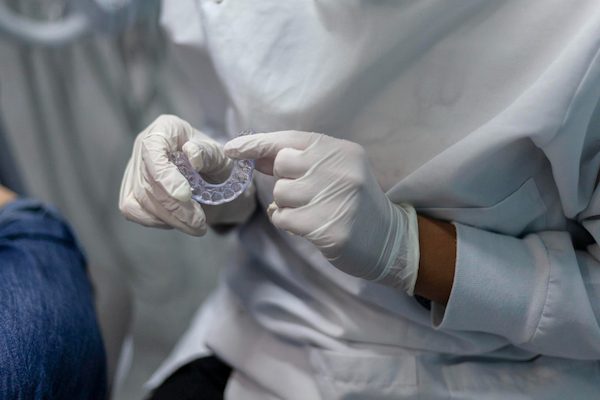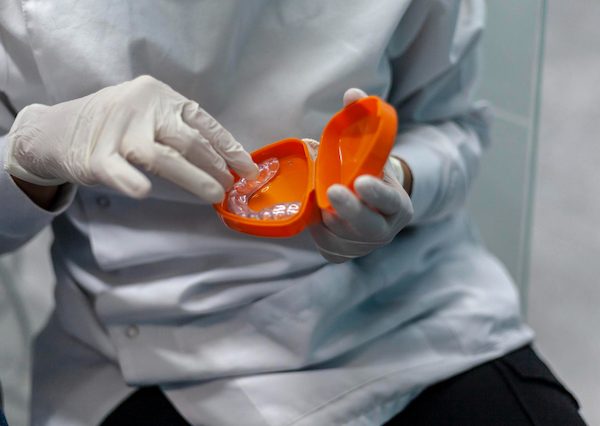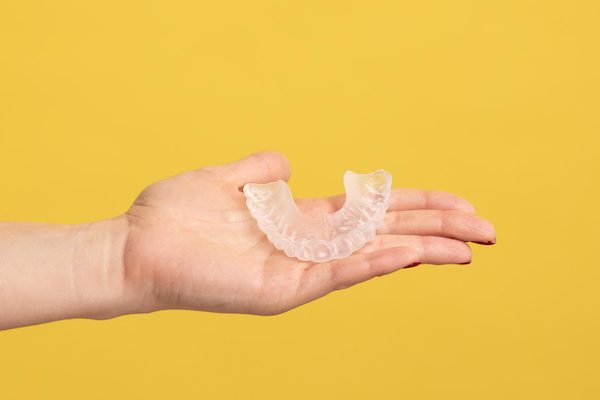Occlusal Splints
Keep Your Teeth Safe While Sleeping

Occlusal Splints Campbelltown
Occlusal splints are removable dental appliances that treat sleep apnea, bruxism, and temporomandibular joint (TMJ) disorder.
For you, your dentist in Campbelltown will expertly fit an occlusal splint to keep your jaw muscles relaxed and stop you from clenching and grinding your teeth.
Signs You Might Need an Occlusal Splint
The first person to notice or inform you that you might need to think about an occlusal splint is frequently your dentist.
Your dentist may find wear on the biting surfaces of your teeth, cracks or chips in your teeth, or stains or indentations on your cheeks and tongue when you go in for a dental check-up. These alterations in the mouth indicate that you might clench or grind your teeth.
Before visiting your dentist, you might occasionally start to experience symptoms that indicate you might require a splint.
These signs may manifest as any of the following:
- Jaw, muscle, or tooth pain or discomfort
- Having trouble chewing food
- opening your mouth may be challenging or limited.
- Headaches caused by tension
- Tooth sensitivity has increased.
Your Campbelltown dentist may suggest and discuss using an occlusal splint based on your symptoms and a thorough dental examination.

What occurs if you don’t use a splint as recommended?
The enamel on the teeth wears away quickly, exposing the soft internal part of the tooth, which also wears away quickly.
Bacteria can reach the nerve if the tooth is allowed to deteriorate, necessitating a root canal procedure.
You might require porcelain veneers or dental crowns to restore the teeth.
Dental implants and crowns are shielded from strong forces that could chip or loosen them.
Making Your Occlusal Splint
Splints are typically moulded from an impression of your teeth and made of hard acrylic resin.
Your Campbelltown dentist will fit and reposition the splint after it is created. You must wear it as directed, visit the office for follow-up visits to monitor the development of your symptoms, and have the splint adjusted as needed.
Your dentist in Campbelltown will give tips on properly taking care of the splint.
How Occlusal Splints Work

Occlusal splints guard the chewing surfaces of the upper teeth. They won’t prevent you from grinding or clenching. It is intended to be worn while sleeping.
But they also protect your teeth from the harm that bruxism can do.
Your Appointment for an Occlusal Splint
Two quick appointments are typically necessary when creating occlusal splints:
Initial Consultation
Your Campbelltown dentist will measure and take impressions of your upper and lower teeth during this appointment.
Next Appointment
Your Campbelltown dentist will now fit your new splint to ensure that it fits snuggly over your upper teeth and into your bite.
Occlusal Splints in Marketfair Dental Care
If untreated, bruxism can lead to broken or cracked teeth and, in rare instances, tooth enamel erosion and eventual loss. If this condition is ignored, the temporomandibular joints (TMJ) in your jaw may also suffer harm.
Visit your Campbelltown dentist today!
Call us at (02) 4620 0800 to learn more about occlusal splints in Campbelltown, or make an appointment online.
We are located at Marketfair Campbelltown Shop 21B, 4 Tindall St in Campbelltown.
FREQUENTLY ASKED QUESTIONS
When are occlusal splints worn?
The majority of occlusal splints are worn while you sleep. Like when you sleep, you may unintentionally grind your teeth and find it difficult to stop.
Wearing your splint while working or studying is an option as well.
How do I care for my occlusal splint?
Maintaining your occlusal splint will help you get the most benefit from it and make sure it lasts as long as possible.
Here at Marketfair Dental Care, we advise you to:
- Always use cold water to wash your splint.
- Clean it before and after wearing
- When not in use, keep it in its container.
When your splint is given to you, your dentist in Campbelltown will provide you with additional guidance on how to take care of it.
Who is suitable for dental implants?
Anyone who has lost a tooth and has enough jawbone is qualified for a dental implant.
